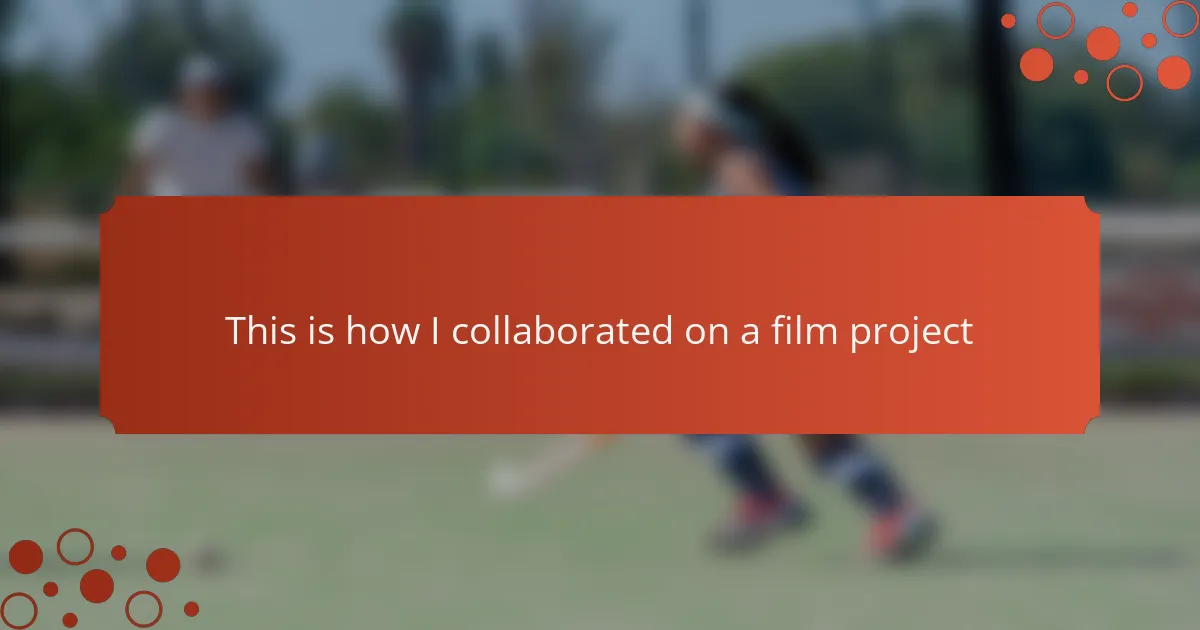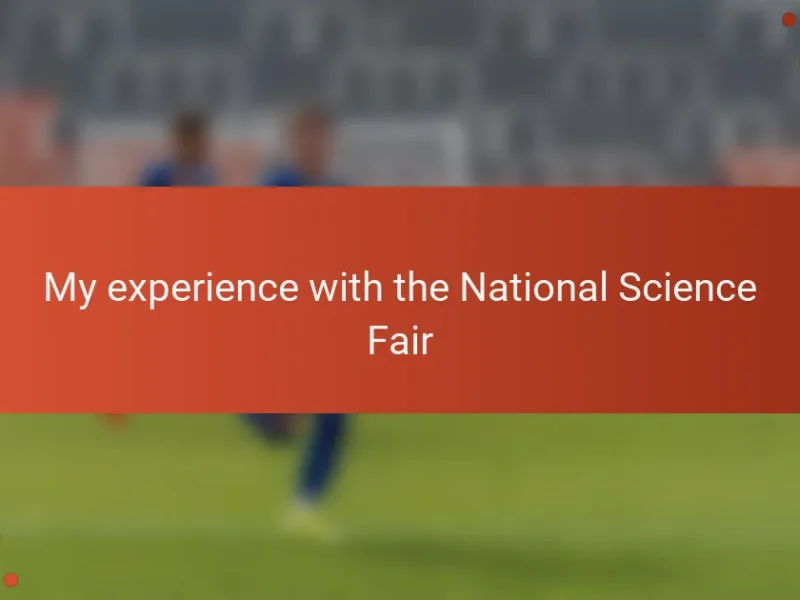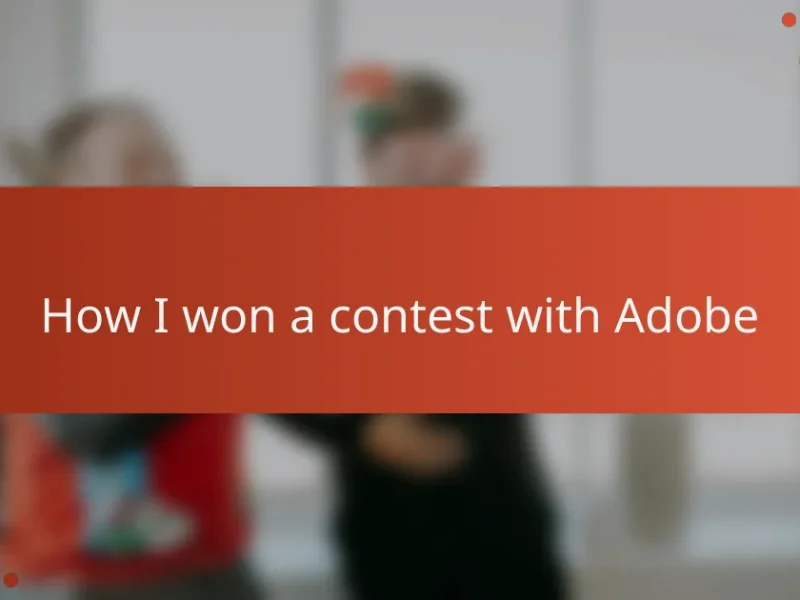Key takeaways
- Video contests foster creativity and collaboration, allowing diverse perspectives to emerge and create powerful storytelling.
- Effective communication tools and clear planning are crucial for smooth collaboration, preventing misunderstandings and keeping teams aligned.
- Being open to feedback and adaptable can lead to unexpected improvements in creative projects, enhancing the final outcome.
- Trust and respect within teams can turn challenges into opportunities, ultimately elevating the creative process and results.
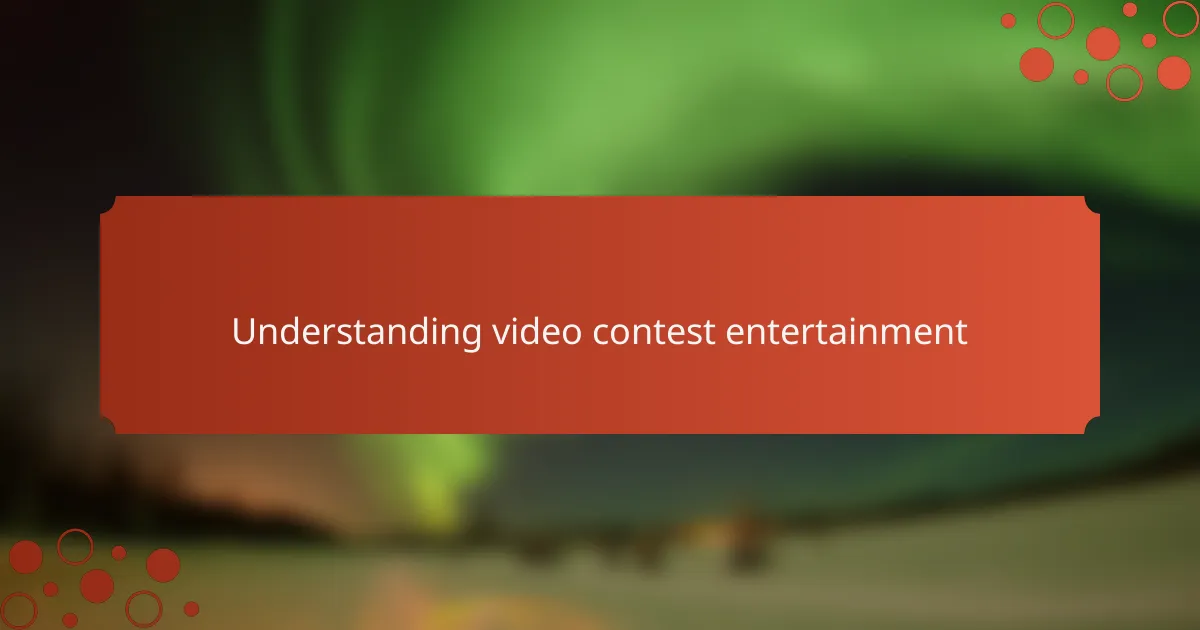
Understanding Video Contest Entertainment
Video contest entertainment has become a vibrant playground where creativity meets competition. From my experience, it’s not just about submitting a video—it’s about telling a story that resonates emotionally with viewers. Have you ever felt that rush when your idea connects with an audience beyond your expectations? That’s the magic at play.
What fascinates me most is how these contests encourage collaboration and innovation, often leading to unexpected artistic breakthroughs. Watching diverse creators bring their unique perspectives together reminds me how powerful collective creativity can be. Isn’t it amazing how a shared goal can unite people from all walks of life?
At the heart of video contest entertainment is the thrill of both creating and competing, a blend that fuels passion and pushes boundaries. It’s a space where technical skill meets storytelling, and every frame counts. Does that challenge excite you as much as it excites me?
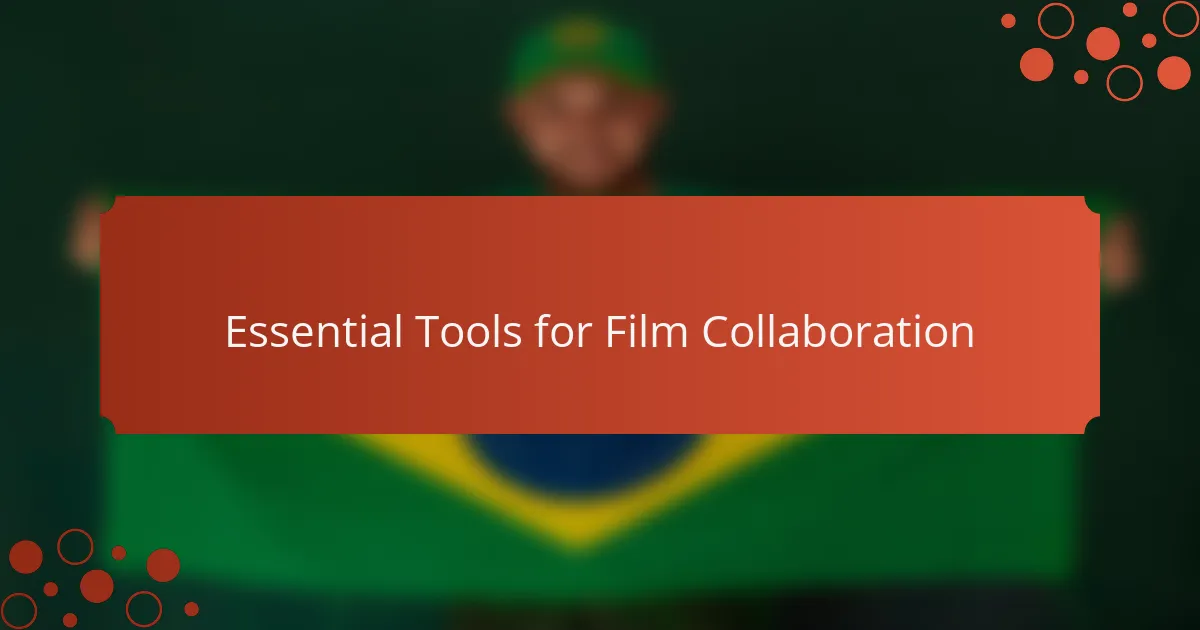
Essential Tools for Film Collaboration
When I first dove into film collaboration, the sheer amount of tools available was overwhelming. But I quickly learned that having the right editing software, like Adobe Premiere or Final Cut Pro, made the storytelling process smoother and more creative. Have you ever noticed how seamless editing can bring a rough cut to life, almost like magic?
Beyond editing, communication tools proved absolutely essential. Platforms like Slack or Zoom were my lifelines for quick feedback and brainstorming sessions, especially when team members were scattered across different locations. I remember a late-night Zoom call where a simple idea sparked a change that transformed our entire scene—it’s moments like that which show how vital clear communication is.
Then there’s cloud storage—Google Drive or Dropbox became my project’s safety net. Sharing scripts, footage, and versions without worrying about lost files kept the collaboration flowing without a hitch. Have you ever experienced the relief of knowing your work is accessible anytime, anywhere? That peace of mind alone is worth its weight in gold.
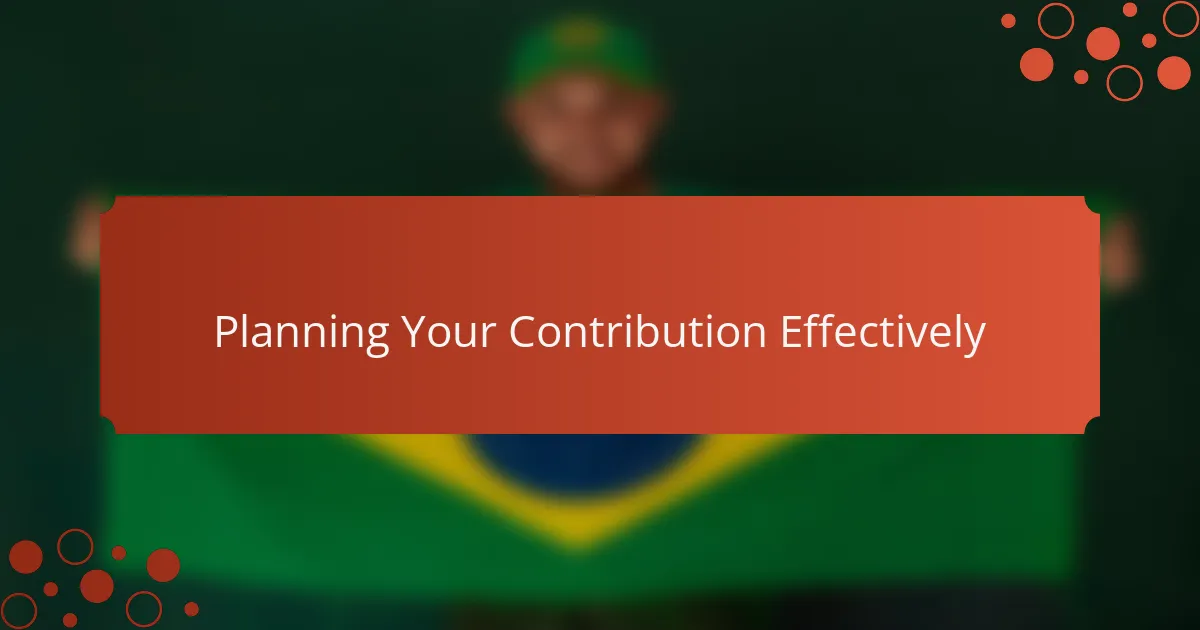
Planning Your Contribution Effectively
Planning your contribution effectively starts with clarifying your role and responsibilities from the get-go. I found that outlining what I was accountable for—whether it was scriptwriting, filming, or editing—helped me avoid confusion and overlap with others. Have you ever been part of a project where tasks weren’t clear? It usually slows everything down, and that’s the last thing you want in a tight contest environment.
Next, setting realistic deadlines alongside the team became my anchor. I remember suggesting we break the project into smaller milestones, which made the entire process less overwhelming and kept motivation high. Checking in regularly wasn’t just a formality; it actually sparked new ideas and kept everyone on the same page. Don’t you think small, steady wins are better than crunching everything last minute?
Lastly, I always made sure to keep an open mind for feedback and adjustments. Planning effectively isn’t about rigidity but about being adaptable when things shift or new creative sparks fly. Once, a last-minute rewrite completely changed the tone of our film—but embracing that change made our final entry resonate even more. How often do you find that your best work comes from unexpected tweaks?
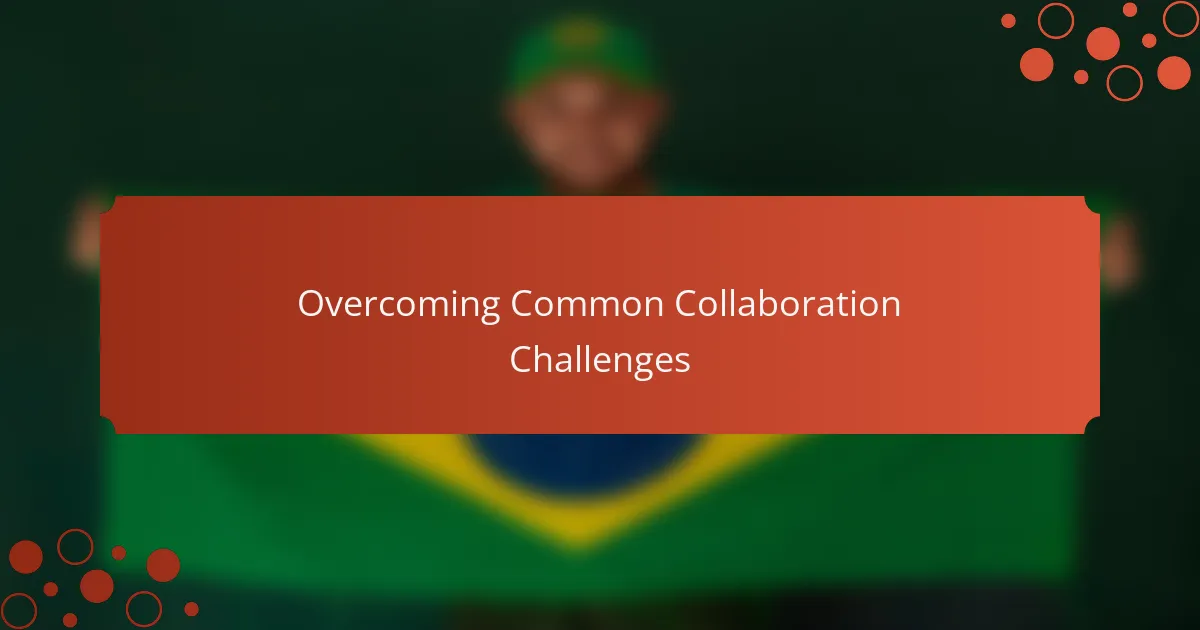
Overcoming Common Collaboration Challenges
Collaboration challenges often pop up when different creative visions collide. I recall a moment when a teammate and I had very different ideas about a scene’s mood—it was frustrating at first. But by openly discussing what each of us wanted to convey, we found a middle ground that actually elevated the story. Have you ever thought that a disagreement might secretly be an opportunity in disguise?
Miscommunication is another hurdle that can slow down progress quickly. In one project, unclear email threads caused confusion about deadlines, leaving everyone scrambling at the last minute. Once we switched to daily check-ins with clear action points, the workflow smoothed out significantly. Doesn’t regular, transparent communication just make everything easier?
Lastly, balancing creative input without stepping on toes can feel tricky. I learned to listen actively and acknowledge everyone’s contributions—this made others more open to hearing my ideas too. When collaboration feels like a dance rather than a tug-of-war, the whole team thrives. Have you noticed how respect can transform teamwork into something truly inspiring?
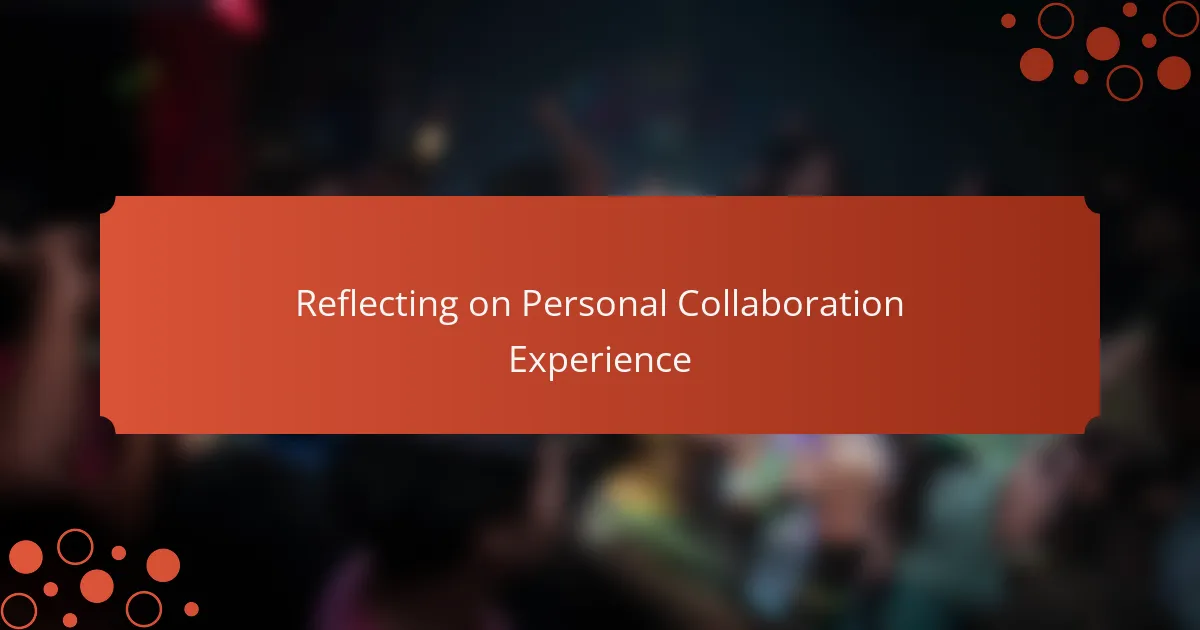
Reflecting on Personal Collaboration Experience
Reflecting on my collaboration experience, I realize how much trust forms the backbone of any successful film project. There was a time when I hesitated to share a rough edit, fearing critique, yet opening up led to invaluable feedback that sharpened our story. Have you ever been surprised by how vulnerability in teamwork actually strengthens the final outcome?
I also found that the ebb and flow of ideas felt like a creative rhythm—sometimes frustrations bubbled up, but those moments pushed us to listen better and refine our vision together. It’s interesting how tension, when handled with respect, can ignite unexpected sparks of brilliance. Doesn’t that remind you of how dynamic collaboration really is?
Looking back, I’m convinced that patience and flexibility were my greatest allies. Deadlines shifted and ideas evolved, yet staying open to change allowed the project to breathe and grow in ways I hadn’t anticipated. How often do you find that the best work emerges when you let go of rigid expectations?
